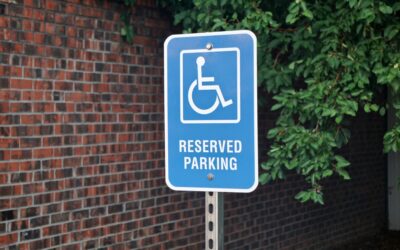(Image description: Three people stand over a desk looking at a laptop. The man on the right is a wheelchair user.)
Throughout history, people with disabilities have been severely marginalized. They were seen as different; often shunned, discriminated against, relegated to institutions; ignored and even ridiculed. This marginalizing attitude projected that if they couldn’t function like “normal” people, they weren’t equal or worthy. The 1900s brought a time of standing up, demanding to be seen and recognized, and a social activism against the hard walls of marginalization and discrimination. In part, wounded soldiers from WWI and WWII helped shift perception. Slowly, over the decades, the idea of equality (which, ironically, is written into our constitution), began to grow, gradually (and still ongoing) shifting the view of people with disabilities from less-than towards equal.
After many protests, hearings, and political, legislative and social battles, in 1990, the Americans with Disabilities Act (ADA) was passed. For the first time in history, the right to equality and requirements for equity were codified into law. Fundamentally, equality means we all have the same human value and the same rights; equity means we all have the same access and opportunities.
The ADA provided federal legislation that established equality and promoted equity by mandating accessibility and accommodations for people with disabilities. Specifically, the ADA declared that employers with 15 or more employees are required to provide reasonable accommodations. A reasonable accommodation is a modification to job application or hiring processes, to job functions and access to equipment or spaces, or changes to the work environment that allow a person with a disability who is qualified to perform the essential functions of that job. This law opened the door to equal employment opportunities.
ADA accessibility requirements apply to workplaces, public spaces, and schools. They enable people with disabilities to fully participate in community and vocational activities within these areas. As people with disabilities gained access to employment, education, and other areas of life, their participation fostered – and continues to foster – inclusion and diversity, and creates benefits for society as a whole (read this Accomodations Overview article to learn more).
In this article we are going to review workplace accommodations; what they are, how to request and acquire them, and why they are so important.
What Are Workplace Accommodations?

A man sits in a multifunctional wheelchair, using a computer with a wireless headset, reaching out to touch the touch screen.
Workplace accommodations are essential adaptations provided to employees with disabilities that allow them to work and thrive to their full potential. These accommodations ensure equal access to employment opportunities, promote inclusivity, and enhance productivity. Common examples include:
- Physical Modifications: Installing ramps, modifying workstations, or providing ergonomic furniture.
- Assistive Technology: Providing screen readers, speech recognition software, or other adaptive tools.
- Flexible Work Schedules: Allowing part-time work, telecommuting, or flexible hours.
- Job Restructuring: Reassigning non-essential tasks or altering how tasks are performed.
- Accessible Communication: Offering sign language interpreters, captioned videos, or written materials in accessible formats.
Such accommodations increase participation in the workforce by people with disabilities, allowing more minds, creativity, and abilities to bring benefit to the community. They increase inclusion, diversity and access for all.
Accommodations benefit not only people with disabilities, but many other people. For example, a ramp into a building benefits both a wheelchair user and a mother pushing a stroller. An elevator benefits both an employee with a mobility disability and a delivery person carrying a heavy package. But most importantly, workplace accommodations support equality and equity by enabling people with disabilities to participate in fair and reasonable hiring practices, access workplaces, and perform essential job functions.
Why Workplace Accommodations Are Needed
For employees with disabilities, workplace accommodations are essential to get to work, get into work, and to perform their essential tasks and duties. Further, when any employee – with or without a disability – feels supported and valued, their overall job satisfaction and performance improves. This creates a workplace culture based on dignity and respect. Accommodations can also address physical health and mental health needs, ensuring a safer and healthier work environment for everyone.
Employers benefit significantly from providing accommodations. Inclusive practices attract a broader talent pool, bringing diverse perspectives and innovative ideas to the organization, and create an organization that supports diversity, equity, and inclusion. Companies known for their inclusive practices carry a positive reputation based on inclusivity, which can attract more customers, clients, and top talent when hiring. Supporting employees with accommodations has been shown to lead to higher staff retention rates, reducing the costs associated with turnover and lost productivity.
How to Obtain Workplace Accommodations
Employees should first assess and identify specific accommodations that they will need to perform effectively on the job. There’s a balance between an accommodation and a convenience. Ramps and wide doorways are reasonable; a premium espresso maker in the office, maybe not. First, review your employer’s accommodation policy so you know what is possible. Next, submit a formal request, usually to your manager or HR, detailing the necessary accommodation(s). Providing medical documentation or other evidence supporting the need for accommodations may be required. If you encounter resistance, you might engage in a collaborative discussion with your employer about the accommodations and look for mutually agreeable solutions. According to the ADA, employers are required to engage in this process and provide reasonable accommodations, unless doing so would cause an undue hardship or a direct threat to other employees or the business.
Still today, however, many companies are resistant to provide accommodations due to associated costs or a simple lack of understanding about ADA requirements. Seek a productive conversation first; you may be educating your employer, and ultimately paving the way for other people with disabilities to find work. If that doesn’t work, there are paths to filing a complaint and seeking compliance. However, that could also tarnish the work relationship. So it’s best to be proactive and cooperative, rather than reactive and demanding.
If you need to file a complaint, you can do so here.
Federal versus State Laws
The Rehabilitation Act of 1973, Section 501, applies to federal employers and also requires reasonable accommodations for employees with disabilities. This law ensures that federal agencies do not discriminate, and take affirmative action to employ and promote qualified individuals with disabilities who perform well.
In addition to federal laws, many states have their own statutes that reinforce or expand upon the requirements of the ADA. These state laws can provide additional protections and ways to access accommodations. Here are a few examples from Colorado specifically.
- Colorado Anti-Discrimination Act (CADA): Revised by the Protecting Opportunities and Workers’ Rights (POWR) Act, CADA aligns closely with the federal ADA but removes the requirement that a disability must have a “significant impact on the job” to warrant accommodations. Instead, it focuses on whether a reasonable accommodation would allow the employee to perform essential job functions. The POWR Act also increases penalties for violations related to discrimination in public accommodations and enhances protections against workplace harassment, making isolated incidents potentially actionable under certain conditions (Husch Blackwell: Trusted Legal Leaders).
- HB21-1110: This law mandates that all state and local government websites and digital services be accessible to individuals with disabilities. This law aims to ensure that public entities adhere to web accessibility standards, enhancing digital inclusivity (Faegre Drinker Biddle & Reath LLP).
- Workers’ Compensation Disability Benefits (HB24-1220): This legislation, effective August 2024, provides additional rights for workers’ compensation claimants, such as the right to refuse modified employment if it requires excessive travel or violates medical restrictions. It also increases the caps on temporary and permanent disability payments.
- HB24-1342: Effective January 2025, this law provides additional rights for individuals with disabilities in the context of professional licensing and certification exams. It requires testing entities to grant accommodations without necessitating a new diagnostic exam if the accommodation was previously granted on a standardized test (Faegre Drinker Biddle & Reath LLP).

A wheelchair user uses a ramp to enter a building.
The Colorado Department of Labor and Employment (CDLE) website offers information on employment laws, including those related to disabilities and workplace accommodations. Their Labor Standards and Statistics division can provide specific guidance. You can find more information at https://cdle.colorado.gov/.
Should you need guidance or representation, Disability Law Colorado offers advocacy and legal assistance to individuals with disabilities, including information on workplace accommodations and state-specific laws. To see how they could be of assistance to you, visit https://www.disabilitylawco.org/.
CPWD serves as an advocate within our community, educating both employers and job seekers on optimal ways to establish effective communication and obtain accommodations. We can offer information about reasonable accommodations, and assist you in making a request, communicating with your employer or potential employer, and navigating discussions with the employer about accommodations. If you need assistance in securing workplace accommodations, reach out to us by calling (303) 442-8662 or email [email protected].
By understanding what workplace accommodations are, how to request them, and recognizing their importance, both employees and employers can work together to foster a more equitable and productive workplace. Accommodations not only benefit individuals with disabilities but also enhance the overall success and diversity of the organization. Embracing equity in the workplace creates an environment where everyone can thrive independently and equally.





